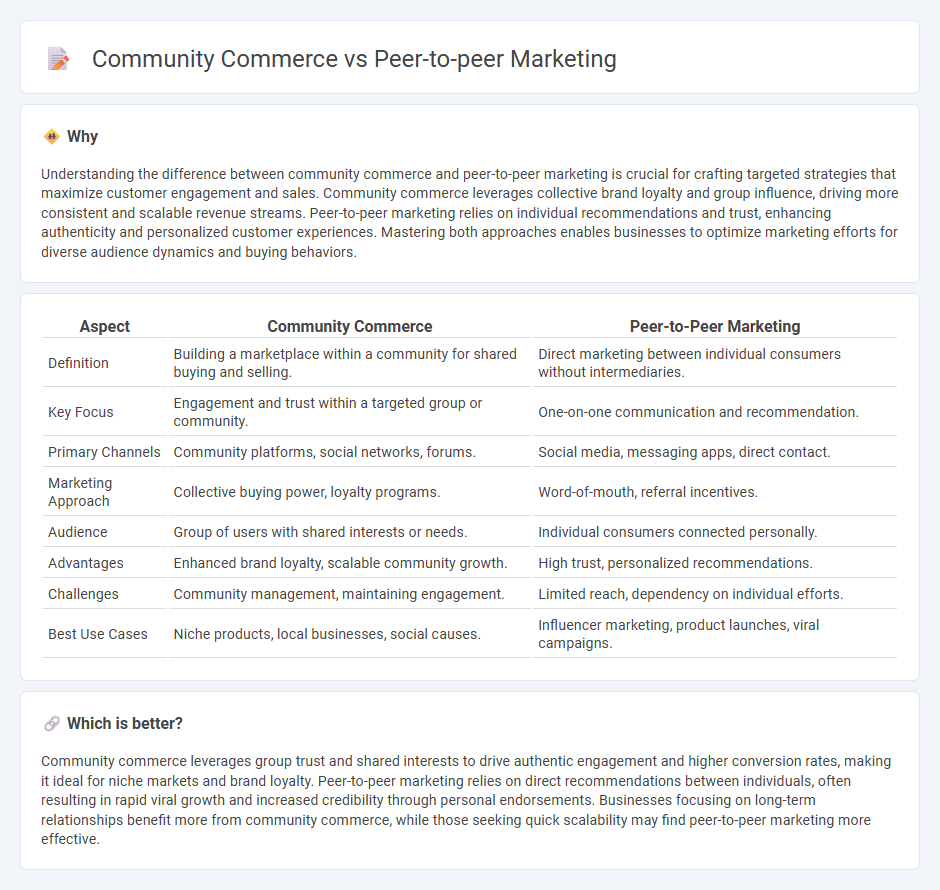
Community commerce fosters brand loyalty by leveraging collective customer experiences and social interactions, creating authentic engagement through shared interests and values. Peer-to-peer marketing, on the other hand, emphasizes direct communication and product endorsements between individuals, increasing trust and influence through personal networks. Discover how these strategies can transform your marketing approach and drive sales growth.
Why it is important
Understanding the difference between community commerce and peer-to-peer marketing is crucial for crafting targeted strategies that maximize customer engagement and sales. Community commerce leverages collective brand loyalty and group influence, driving more consistent and scalable revenue streams. Peer-to-peer marketing relies on individual recommendations and trust, enhancing authenticity and personalized customer experiences. Mastering both approaches enables businesses to optimize marketing efforts for diverse audience dynamics and buying behaviors.
Comparison Table
| Aspect | Community Commerce | Peer-to-Peer Marketing |
|---|---|---|
| Definition | Building a marketplace within a community for shared buying and selling. | Direct marketing between individual consumers without intermediaries. |
| Key Focus | Engagement and trust within a targeted group or community. | One-on-one communication and recommendation. |
| Primary Channels | Community platforms, social networks, forums. | Social media, messaging apps, direct contact. |
| Marketing Approach | Collective buying power, loyalty programs. | Word-of-mouth, referral incentives. |
| Audience | Group of users with shared interests or needs. | Individual consumers connected personally. |
| Advantages | Enhanced brand loyalty, scalable community growth. | High trust, personalized recommendations. |
| Challenges | Community management, maintaining engagement. | Limited reach, dependency on individual efforts. |
| Best Use Cases | Niche products, local businesses, social causes. | Influencer marketing, product launches, viral campaigns. |
Which is better?
Community commerce leverages group trust and shared interests to drive authentic engagement and higher conversion rates, making it ideal for niche markets and brand loyalty. Peer-to-peer marketing relies on direct recommendations between individuals, often resulting in rapid viral growth and increased credibility through personal endorsements. Businesses focusing on long-term relationships benefit more from community commerce, while those seeking quick scalability may find peer-to-peer marketing more effective.
Connection
Community commerce leverages the trust and engagement within niche groups to facilitate direct buying and selling, enhancing peer-to-peer marketing effectiveness. Peer-to-peer marketing thrives in these settings by enabling authentic recommendations and user-generated content that drives higher conversion rates. Both strategies rely on social proof and personalized interactions, creating a synergistic ecosystem that boosts brand loyalty and sales growth.
Key Terms
Peer-to-peer marketing:
Peer-to-peer marketing harnesses direct communication between consumers to drive brand awareness, leveraging trust and authentic recommendations that traditional advertising often lacks. This approach amplifies word-of-mouth through digital platforms, increasing engagement and conversion rates by tapping into established social networks. Explore how peer-to-peer marketing can transform your customer acquisition and retention strategies.
Word-of-mouth
Peer-to-peer marketing leverages direct recommendations between individuals to boost brand trust and authenticity through genuine word-of-mouth endorsements. Community commerce amplifies this effect by fostering a dedicated group of consumers who actively share experiences and promote products within a shared interest network. Explore further to understand how these strategies drive customer engagement and revenue growth.
Referral programs
Peer-to-peer marketing leverages personal connections to amplify brand trust through customer referrals, maximizing word-of-mouth impact and generating high-quality leads. Community commerce integrates referral programs within a collective environment, fostering loyalty and shared experiences that enhance customer retention and lifetime value. Explore how referral programs in these models can boost growth and engagement in your business strategy.
Source and External Links
What is Peer-to-Peer Marketing: The Fast and Easy Guide - Peer-to-peer marketing is when customers promote a business by recommending it to friends, family, or colleagues, leveraging trust to build brand loyalty and ambassadors.
What's P2P Marketing? An introduction to the Peer-to-Peer strategy - P2P marketing is powerful because people trust recommendations from peers over traditional ads, making it highly authentic and effective for driving purchases.
Why Peer-to-Peer Marketing Works | Iterable - P2P marketing turns customers, partners, and employees into marketing channels by encouraging them to share genuine reviews and experiences, effectively evolving word-of-mouth into scalable advocacy.
 dowidth.com
dowidth.com